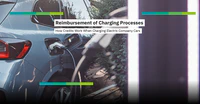More and more companies are converting their company car fleets to electric vehicles—not just for environmental reasons, but also due to tax benefits and lower operating costs. For drivers and fleet managers alike, electric company cars offer numerous advantages over traditional combustion engines. This article highlights the most relevant aspects and explains why the switch is worthwhile.
1. Sustainability and Corporate Image
An electric company car emphasizes a company’s commitment to sustainability. It represents innovation, environmental awareness, and forward-thinking action. Especially in the context of ESG criteria and corporate social responsibility, this can be a decisive competitive advantage.
2. Tax Benefits Through the 0.25% Rule
Fully electric company cars with a gross list price of up to €100,000 benefit from the so-called 0.25% rule. This means the taxable benefit for private use is calculated at only 0,25% of the list price. Compared to the 1% rule for combustion vehicles, this results in significant tax relief for employees. Additionally, electric vehicles are exempt from vehicle tax for an extended period—now until 2035 instead of 2030. This provides added planning security and further reduces ongoing costs.
Additional details on this topic can be found in our blog article: Tax benefits of electric company cars in Germany .
Download our charge@home Guide now!
Our guide highlights the requirements for a home charging solution and explains what is needed to use it for legally compliant billing of company cars. Learn more about the installation of wallboxes, legal frameworks, and efficient billing solutions for home charging.
REQUEST GUIDE
3. Charging Convenience, Especially at Home
Charging an electric vehicle is often more convenient than refueling. Those with a private wallbox, such as in a single-family home, can easily charge their vehicle overnight. This saves time and increases everyday flexibility. Home charging can be billed in a legally compliant and automated way using solutions like the Charge Repay Service. Learn more on our page: Charging and billing electric company cars at home .
Charging on the go is also becoming easier. Germany’s charging infrastructure is currently being expanded nationwide—in both urban and rural areas. The “Deutschlandnetz” initiative will add around 9,000 new fast-charging points at over 1,000 locations by 2026. This makes medium and long-distance travel reliably feasible with fast-charging stations. Depending on the vehicle model, charging times of around 20 minutes for over 300 kilometers of range are possible.
4. Potentially Lower Energy Costs
Electricity—especially when charging at home or using self-generated solar power —is often cheaper than gasoline or diesel. However, actual savings depend heavily on individual charging behavior. Those who primarily use public charging stations should carefully review the cost structure.
5. Reduced Maintenance Requirements
Electric vehicles require less maintenance than combustion engines. Oil changes, clutch replacements, and complex engine repairs are no longer necessary. Brake wear is also significantly lower, as many EVs recover energy during deceleration (regeneration), which reduces the use of mechanical brakes. While these advantages are often factored into leasing rates, lower maintenance needs can still positively impact overall operating costs.

6. Driving Comfort and Enjoyment
Electric cars offer immediate responsiveness, quiet operation, and an overall more pleasant driving experience. Their advantages are especially noticeable in city traffic or during frequent stop-and-go situations, thanks to their silent and low-vibration drive systems.
7. Parking Advantages
Many cities offer dedicated parking spaces for electric vehicles. These are often centrally located and equipped with charging infrastructure, making everyday life easier for company car drivers.
Conclusion
An electric company car offers numerous benefits, including tax relief, lower operating costs, and a positive impact on corporate image. With solutions like the Charge Repay Service, even home charging can be billed easily and legally—regardless of whether the wallbox complies with calibration law.




